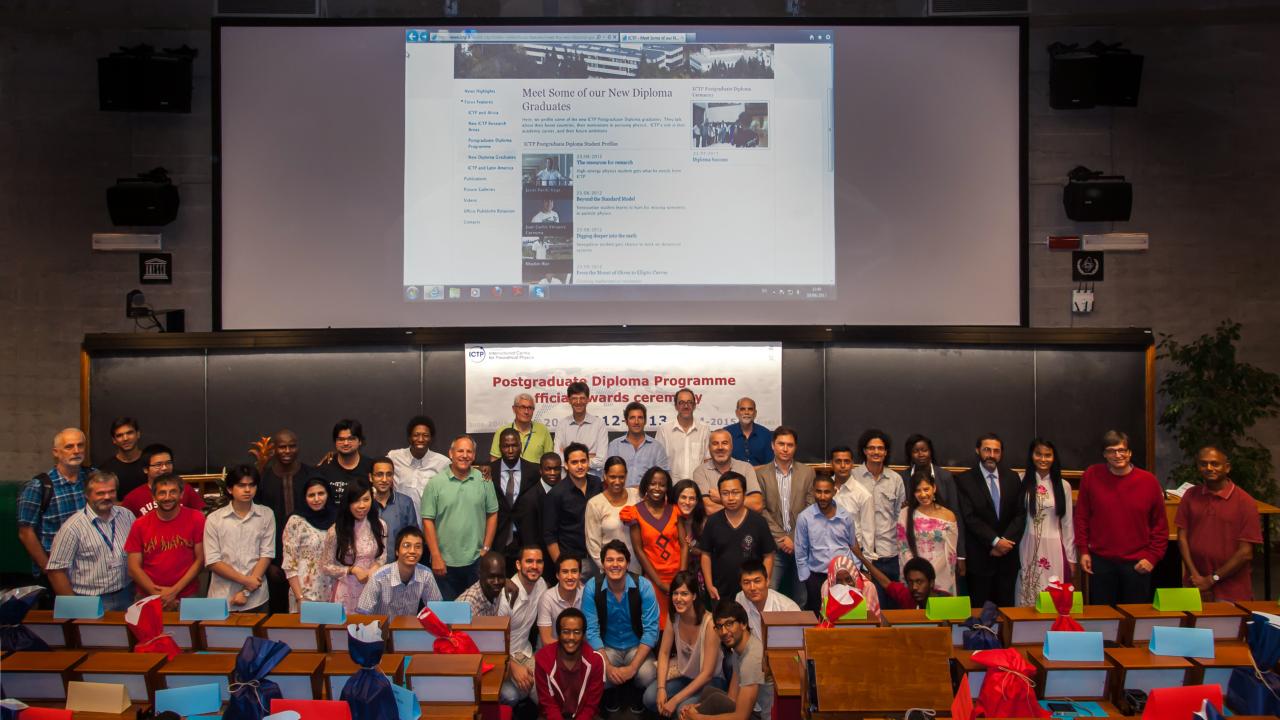
A celebratory mood filled the air in ICTP's Main Lecture Hall this morning as 35 young scholars from around the developing world received diplomas after completing the Centre's intense, year-long Postgraduate Diploma Programme.
"This is a special moment in your career that marks the start of your future," said ICTP Director Fernando Quevedo, addressing the scholars at the Diploma graduation ceremony. Quevedo encouraged the graduates to stay in contact with ICTP, reminding them of the many, life-long opportunities to do so at the Centre. "ICTP has a holistic approach to helping scientists, with programmes for every stage of their careers," he said.
Of the Diploma graduates, 11 will be pursuing PhDs at universities throughout the world. Four graduates have been admitted to ICTP's joint PhD programme with the International School for Advanced Studies (SISSA), Trieste, joining the 12 other Diploma graduates who have been studying for their degrees since the programme started in 2011.
Additionally, five Diploma graduates will pursue masters degrees, and 15 are returning to their home countries to follow various opportunities there.
This year's Diploma graduates--10 of whom are women--came from 22 countries in Africa, Asia and Latin America.
Given the opportunity to speak at the end of the ceremony, several Diploma graduates shared personal thoughts about their experience at ICTP. Essodjolo Kpatcha, the first scholar from Togo to enter the Diploma programme, said that ICTP has "built a full scientist, ready to take the next step," adding, "By bettering myself, I improve conditions for others, and therefore improve the world." After the ceremony, he shared his thoughts about science education in Togo and said that he would like to go back and educate more professors and students about ICTP and the opportunities it offers.
Syed Muntazir Abidi cited fellow Pakistani and ICTP founder Abdus Salam as a mentor: "He had a mission to do something for humanity...no one has done for science what Salam has done." Sarah Cepeda Humerez, from Bolivia, echoed the humanity aspect of science by adding that she was inspired by a sign posted near ICTP's Marie Curie Library that has the words 'science for peace'. "The Diploma Programme teaches us more than physics, it also teaches us about humanity, showing the world that by working side by side with so many nationalities we can live in peace as one."
Sylvia Mueni Mutisya, a Kenyan national, says that is not easy for women to pursue a career in physics in Kenya, but with a lot hard work and the ICTP Diploma certificate under her belt she is set to pursue her PhD in Universidade Federal do ABC, Brazil.
The ICTP Postgraduate Diploma Programme is a gateway for young people who might otherwise not have a chance to reach international-level standards in physics and mathematics. Its goal is to train students from developing countries so they can compete favourably for graduate studies in any centre of learning in the world. Shohruh Holmatov from Uzbekistan drives home the point saying "ICTP is very rich in resources, you can get any [scientific] paper, and any other resource you want at ICTP."
The Programme consists of a rigorous, one-year, pre-doctoral course of study, with a small part devoted to independent projects. Areas of instruction include high-energy physics, condensed matter physics, mathematics, and earth system physics. After completing the Postgraduate Diploma Programme, most students go on to PhD work in Europe or North America, with many returning to their native countries on completion of their studies. Others return to jobs as college teachers, or register for PhD programmes in their home countries.













